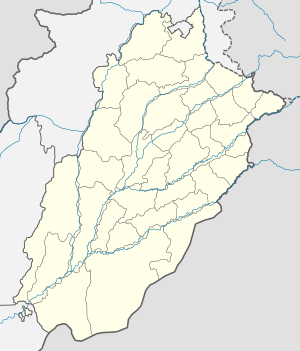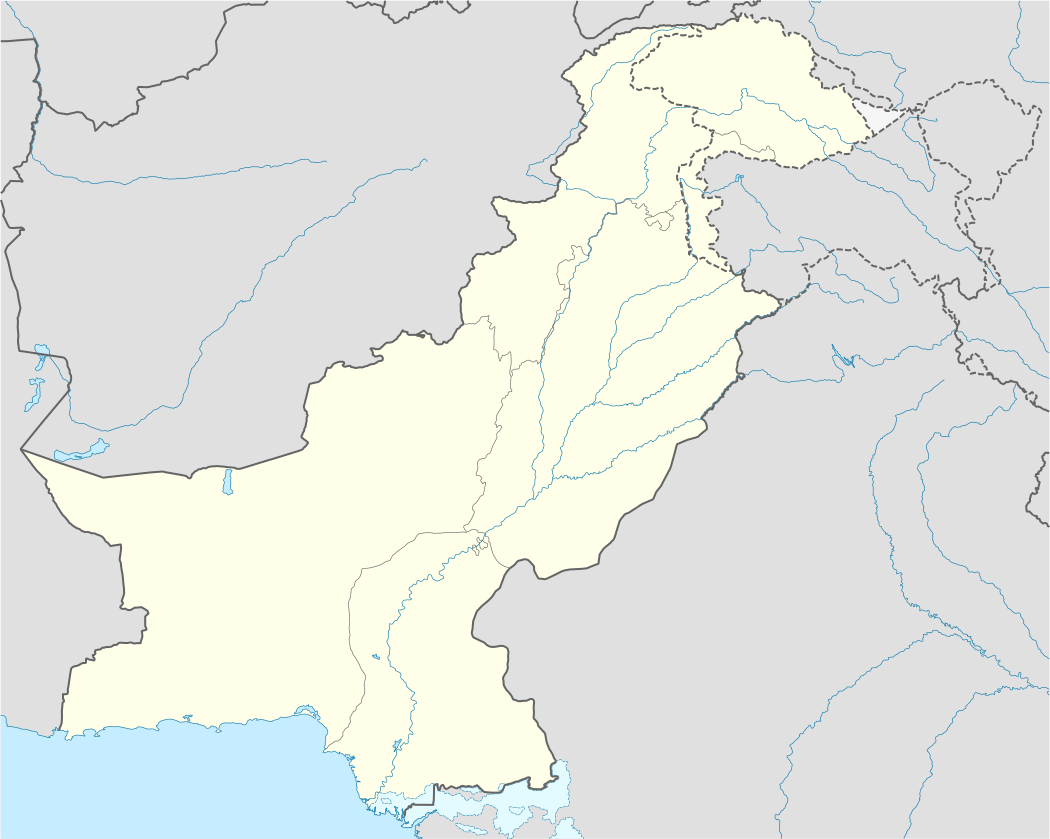Nankana Sahib
Nankana Sahib (Urdu: ننکانہ صاحِب, romanized: nankāna sāhib; Punjabi: ننکاݨا صاحب, romanized: nankāṇā sāhab) is a city and capital of Nankana Sahib District in the Punjab province of Pakistan. It is named after the first Guru of the Sikhs, Guru Nanak, who was born in the city and first began preaching here. Nankana Sahib is the most important religious site for the Sikh religion.[2][3] It is located about 91 km (57 mi) west of Lahore and about 75 km (47 mi) east of Faisalabad.[4] According to the census of 2017 the city has a population of 79,540 inhabitants.[5] Until 2005, it was the part of Sheikhupura District.
Nankana Sahib ننكانہ صاحِب | |
|---|---|
City | |
| The City of Nankana Sahib | |
 | |
 Nankana Sahib  Nankana Sahib | |
| Coordinates: 31°27′0″N 73°42′24″E | |
| Country | |
| Province | |
| Division | Lahore |
| District | Nankana Sahib |
| Government | |
| Elevation | 187 m (614 ft) |
| Population | |
| • City | 79,540 |
| District Council | 3 seats |
History
The township was founded by Rai Bhoi, a Muslim and thus was known as Rai-Bhoi-Di-Talwandi.[6] His great-grand son Rai Bular Bhatti, renamed it as 'Nankana Sahib' after the birth of Guru Nanak. The Gurdwara Nankana Sahib, originally constructed in around 1600 CE was renovated in 1819–20 CE by Gian-Punjab Maharaja Ranjit Singh The Sikh Conference of Panjab, Jammu and Kashmir, Peshawar, Kangra and Hazara.
During the Akali movement, on 20 February 1921, Narain Das, the Udasi mahant (clergy) of the gurdwara at Nankana Sahib, ordered his men to fire on Akali protesters, leading to the Nankana massacre. The firing was widely condemned, and an agitation was launched until the control of this historic Janam Asthan Gurdwara was restored to the Sikhs.[7] Again in the 1930s and 1940s the Sikhs added more buildings and more architectural design.
Migration between India and Pakistan was continuous before independence. By the 1940s Western Punjab was predominantly Muslim and supported the Muslim League and Pakistan Movement. After independence in August 1947, the minority Sikhs and Hindus migrated to India while the Muslim refugees from India settled in the Western Punjab and across Pakistan.[8]
Geography
Nankana Sahib and it surroundings were formerly a tehsil of Sheikhupura District. In May 2005, the provincial government raised the status of Nankana Sahib to a district[9] as a way of promoting development in the area. The present status is District Nankana Sahib has three tehsils: Nankana Sahib, Shah Kot, and Sangla Hill. Before December 2008, District Nankana Sahib also included Safdarabad Tehsil.
There are plans to construct a 100 acres (40 ha) university as well as hospitals and health care facilities by the district government with mutual interest of local communities and family of Rai Bular.[10]
In 2007, the Pakistan government announced a plan to set up a university on Sikh religion and culture at Nankana Sahib, the birthplace of Guru Nanak. Chairman of Pakistan's Evacuee Trust Property Board (ETPB), Gen (R) Zulfikar Ali Khan, said that "The international Guru Nanak University planned at Nankana Sahib would have the best architecture, curricula and research centre on Sikh religion and culture", .[11]
In 2019 after prolonged efforts of the Sikh community the historical Gurudwara on Nankana sahib was given direct access to piligrims via the Kartarpur corridor project.[12] The first batch of Sikh pilgrims arrived in Pakistan on 12 November, the historical occasion of the 550th gurupurab (birth anniversary) of Guru Nanak, the founding guru of Sikhism.
Transportation
- Nankana sahib interchange Exit 3 on M3 motorway (Pakistan)
- Railway Station Nankana Sahib on Shorkot–Sheikhupura Branch Line
- Faisalabad International Airport 88KM
- Allama Iqbal International Airport Lahore 96KM
- Jaranwala-Nankana Road
Notable Places
- Quba Masjid (A replica of Quba Masjid of Madina)
- Gurdwara Janam Asthan
- Nankana Lake Resort[13] [14][15]
- Residency of Baba Guru Nanak
Notable people
- Rai Bular Bhatti
- Mohammad Irfan Pakistani cricketer
- Rai Mansab Ali Khan
- Rai Rashid Ahmed Khan
- Shizra Mansab Ali Khan
- Guru Nanak founder and first of the Sikh gurus
- Ganga Ram
- Ijaz Shah
- Babra Sharif film actor
- Barjees Tahir
Education
Universities/Higher Education Institutes
- Virtual University of Pakistan Nankana Sahib Campus
- Baba Guru Nanak University
Schools
- Dar-e-Arqam Schools
- Allied Schools (Pakistan)
- Pak Garrision School [16]
Police Stations
There are two Police stations in Nankana Sahib
- Police Station City Nankana Sahib
- Police Station Sadar Nankana Sahib
Hospitals
- District Head Quarter Hospital
See also
| Wikiquote has quotations related to: Nankana Sahib |
References
- https://www.citypopulation.de/Pakistan-Punjab.html?cityid=11398
- Iqbal, Amjad (22 November 2015). "Over 2,500 Indian Sikhs attend annual pilgrimage". DAWN.COM. Retrieved 20 April 2016.
- Historical Gurudwaras:Nankana Sahib Archived 2011-09-14 at the Wayback Machine. Sgpc.net. Retrieved on 2011-11-15.
- Nankana Sahib Archived 2011-12-22 at the Wayback Machine. Nha.gov.pk. Retrieved on 2011-11-15.
- https://www.politicpk.com/nankana-sahib-district-population-of-cities-towns-and-villages-2017-2018/
- Khalsa, Sukhmandir (1 January 2010). "Historical Gurdwaras of Nankana, Pakistan Commemorating Guru Nanak Dev". About.com Religion & Spirituality. Retrieved 20 April 2016.
- Singh, Roopinder (March 23, 2011). "Bhagat Singh: The making of the revolutionary". The Tribune. Retrieved 2011-10-23.
Bhagat Singh was a well-read, articulate young man who significantly impacted Indian history and left behind a legacy that even 80 years after his martyrdom is still very much a part of our cultural ethos
- Dube, I. &. S. (2009). From ancient to modern: Religion, power, and community in India hardcover. Oxford University Press.
- Nankana becomes a district. Dawn.com. Retrieved on 2011-11-15.
- "Nankana Sahib in Pak to be a recreational village". The Times of India. Sep 27, 2003. Retrieved 2011-10-23.
- "Pak govt plans university at Nankana Sahib". The Times of India. Apr 17, 2007. Retrieved 2011-10-23.
- "PILGRIMAGE TO KARTARPUR SAHIB". prakashpurb550.mha.gov.in. Retrieved 2020-01-04.
- https://www.facebook.com/NankanaLakeResort/
- http://pakistanhotels.com.pk/nankana-lake-resort-nankana-sahib/
- https://www.pakwheels.com/forums/t/nankana-lake-resort-and-gurdwara-nankana-sahib/230787
- Pak Garrison Buland School System
| Wikivoyage has a travel guide for Nankana Sahib. |